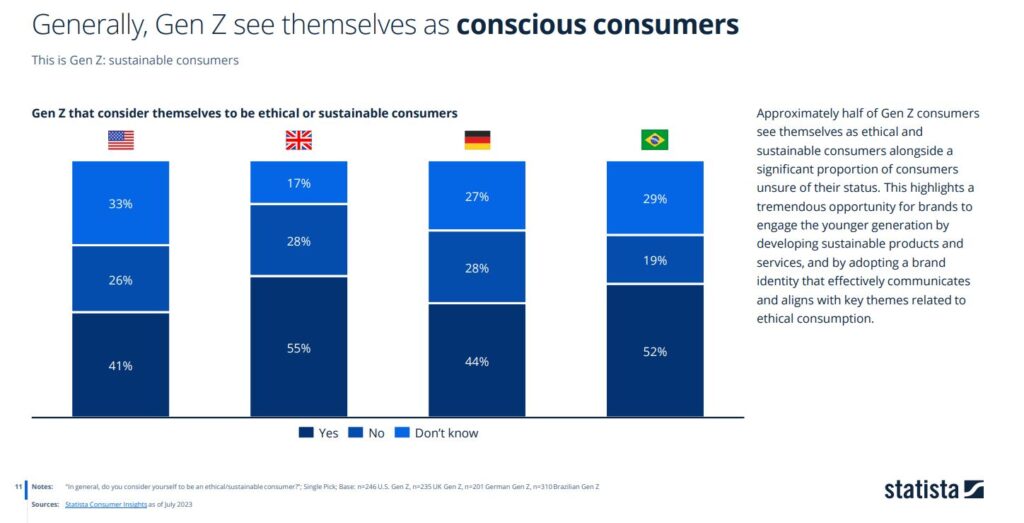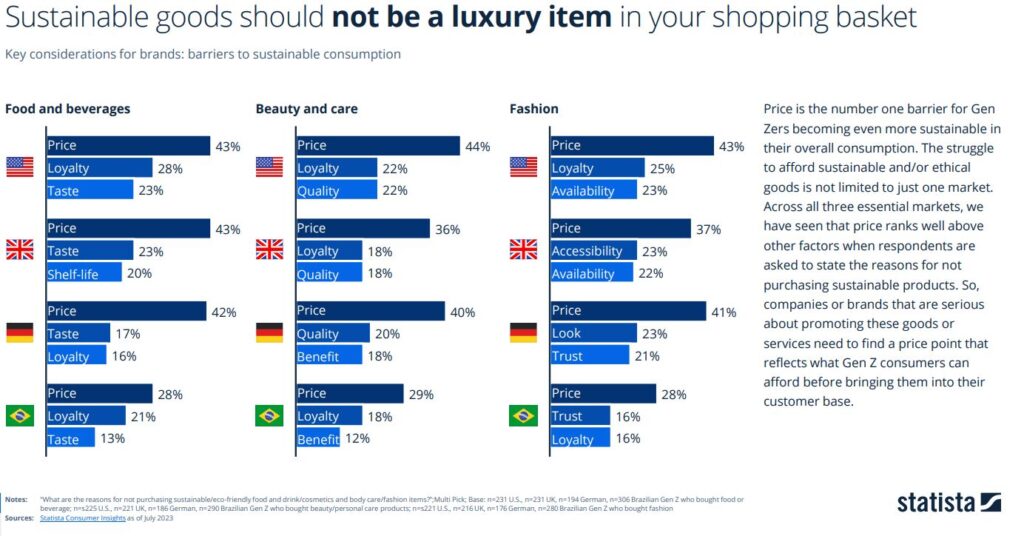In the recent years, sustainable shopping has emerged as a significant force in consumer behavior. It is driven by growing awareness of environmental and social issues.
This shift is not only about making eco-friendly choices but also about influencing broader market trends. Recent studies highlight how generational dynamics play a crucial role in this movement. Gen Z leading the charge and impacting shopping habits across all age groups.
Here you can read more about why sustainable shopping is important. Moreover, how the influence of Gen Z is accelerating this trend according to Forbes and other media outlets.
The Importance of Sustainable Shopping: A Path to a Greener Future
1. Reducing Environmental Impact
The environmental cost of traditional shopping practices is substantial.
Industries like fashion and electronics often contribute to pollution, resource depletion, and waste.
Sustainable shopping focuses on minimizing these impacts by supporting products made from renewable resources, reducing waste, and lowering carbon emissions.
For example, opting for clothing made from organic or recycled materials helps decrease the strain on natural resources and reduces pollution.

2. Promoting Ethical Practices
Sustainable shopping also emphasizes ethical production practices. Many traditional supply chains involve exploitative labor practices, including unfair wages and poor working conditions.
By choosing products from companies committed to
- fair trade principles or
- with transparent supply chains,
consumers can support better working conditions and fair wages for workers worldwide.
3. Encouraging Resource Conservation
The essence of sustainability is to conserve resources for future generations.
This involves making choices that
- reduce waste and
- enhance resource efficiency.
Sustainable shopping encourages consumers to buy products that are designed to last longer. Use resources more efficiently, and have a lower environmental footprint.
4. Influencing Consumer Behavior Across Generations
Recent studies have shown that Gen Z consumers are not only environmentally conscious. Also have a significant influence on their families’ shopping habits.
A recent report from First Insight reveals that Gen Z’s commitment to sustainability is impacting even their Gen X parents. Moreover, their Baby Boomer grandparents as well.
In the two years since the report’s initial publication, Gen X consumers have shown a marked increase in their preference for sustainable brands.
Their willingness to pay more for sustainable products has surged by 42%. Nearly 90% of Gen X consumers are now prepared to spend an extra 10% or more for eco-friendly options.

This generational shift highlights the powerful ripple effect that Gen Z’s values can have on broader consumer trends. Just two years ago, only 58% of consumers across all generations were willing to spend more for sustainable options.
Today, that number has risen dramatically, with nearly 90% of Gen X consumers demonstrating a willingness to invest more in sustainable products. This shift underscores how the commitment of younger consumers is driving significant change in shopping habits across all age groups.
Sustainable shopping and Green certifications
Green certifications and sustainable shopping are closely connected. As green certifications provide a trusted benchmark for environmentally and socially responsible products.
These certifications, such as Energy Star, Fair Trade, and USDA Organic etc., verify that products meet specific sustainability standards, helping consumers make informed choices.
By purchasing certified products, shoppers support practices that reduce environmental impact, promote ethical labor conditions, and ensure resource conservation. Thus, green certifications act as a guide for sustainable shopping, ensuring that consumer choices align with broader sustainability goals.
Sustainable Shopping Practices
Sustainable shopping practices involve making choices that minimize environmental impact and promote ethical standards.
This includes
- selecting products (aka sustainable fashion products) made from eco-friendly materials,
- supporting brands with transparent and fair labor practices, and
- opting for items that are durable and designed to last, and
- buying products from local brands.
Additionally, sustainable shopping encourages
- reducing waste through recycling and reusing,
- choosing energy-efficient appliances, and
- buying in bulk to cut down on packaging.
By incorporating these practices, consumers can significantly reduce their ecological footprint and contribute to a more sustainable and equitable world.
50% GenZ Consumers are Conscious Customers
Around 50% of Gen Z consumers identify as ethical and sustainable shoppers, while a substantial number are uncertain about their own consumption practices.

This presents a major opportunity for brands to connect with younger audiences by creating sustainable products and services and by cultivating a brand identity that resonates with the principles of ethical consumption.
Sustainable goods should not be a luxury item
Cost remains the primary obstacle for Gen Z in adopting more sustainable consumption habits.

The challenge of affording sustainable or ethical products is widespread across various markets.
In surveys, price consistently outweighs other factors as the main reason for not buying sustainable items.
Therefore, companies aiming to attract Gen Z consumers must ensure their products are priced within reach of this demographic to effectively engage them.
The future: Gen Z’s shopping influence and income in 2031
Gen Z’s influence will only increase as the younger members of this cohort grow into adulthood.
By 2030, Gen Z will represent 27% of the world’s income, surpassing Millennials by 2031, according to the Insider‘s article from 2021.
Since this generation also supports brands that also support their own values and causes, it’s imperative that brands and retailers become aligned with theses consumers before it’s too late.
